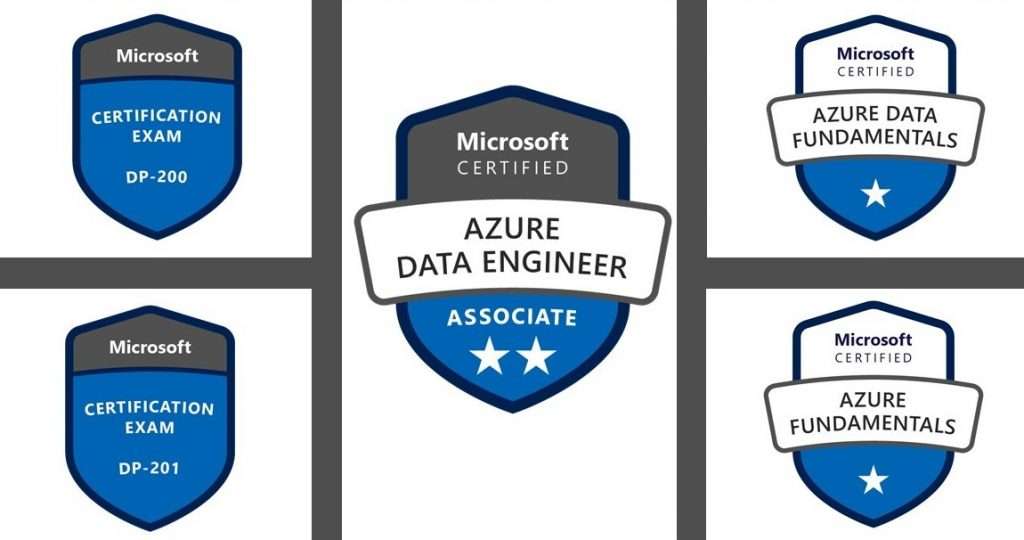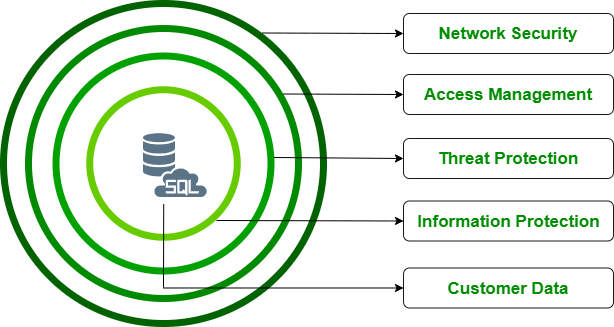
- Introduction to Azure Data Engineer Associate Certification
- Roles and Responsibilities of an Azure Data Engineer
- Prerequisites for Azure Data Engineer Certification
- Exam Format and Structure (DP-203)
- Key Skills Required for Azure Data Engineers
- Azure Data Services Overview (Azure SQL, Data Lake, Synapse, etc.)
- Security and Compliance in Azure Data Engineering
- Study Materials and Best Resources
- Practical Hands-on Labs and Projects
- Career Opportunities After Certification
- Common Mistakes to Avoid in the DP-203 Exam
- Exam-Day Tips and Tricks
- Conclusion
Introduction to Azure Data Engineer Associate Certification
The Azure Data Engineer Associate certification (exam code DP-203) is designed for professionals who want to demonstrate proficiency in using Microsoft Azure’s data services to manage and transform data. As data continues to grow in importance across businesses, organizations need skilled data engineers who can design, implement, and manage data solutions that are scalable, secure, and efficient. This certification validates that an individual has the necessary skills to perform these tasks in Azure environments, making it an excellent step for anyone looking to build or further their career in cloud data engineering.
Roles and Responsibilities of an Azure Data Engineer
- Data Ingestion: Building solutions for collecting and moving data from multiple sources into Azure storage and processing environments.
- Data Transformation: Designing data transformation pipelines using tools like Azure Data Factory, Azure Databricks, or Azure Synapse Analytics.
- Data Storage: Managing data storage solutions, including Azure Data Lake, Azure SQL Database, Azure Blob Storage, and Cosmos DB.
- Data Security: Implementing security measures to ensure data privacy and compliance, including using Azure Active Directory (Azure AD) for access management and encryption features for secure data storage.
- Monitoring and Optimization: Ensuring data pipelines and storage systems run efficiently and reliably, with performance tuning where necessary.
- Collaboration: Working with business analysts, data scientists, and other stakeholders to understand data requirements and provide the appropriate solutions.
An Azure Data Engineer is responsible for various tasks related to managing and transforming data on Microsoft Azure. Their primary responsibilities include:
Azure Data Engineers ensure data is accessible, secure, and optimized for analysis and reporting.
Prerequisites for Azure Data Engineer Certification
Before pursuing the Azure Data Engineer Associate certification (DP-203), it’s essential to have a solid understanding of some foundational skills. First, a basic knowledge of cloud concepts is crucial, including familiarity with cloud services, architecture, and key Azure concepts like virtual machines, storage accounts, and virtual networks. You should also have experience managing and querying databases, whether SQL or NoSQL, and working with storage systems like Azure Blob Storage and Azure Data Lake. Basic programming skills, such as proficiency in SQL, Python, or Spark, are beneficial for data manipulation, transformation, and working with data pipelines. Additionally, familiarity with Azure tools like Azure Data Factory, Azure Synapse Analytics, Azure Databricks, and Power BI will be helpful for preparing for the exam. With these foundational skills in place, you’ll be better equipped to dive deeper into the more advanced Azure data services, which are key to successfully passing the DP-203 exam.

Exam Format and Structure (DP-203)
- Number of Questions: The exam typically consists of 40-60 questions.
- Question Types: The questions can be multiple-choice, multiple-answer, drag-and-drop, and scenario-based.
- Time Limit: The exam is typically 120 minutes long.
- Passing Score: The passing score is 700 out of 1000 points.
- Exam Delivery: The exam can be online or at a Pearson VUE test center.
- Language: The exam is available in English, Japanese, Korean, and Chinese.
- Designing and Implementing Data Storage: 40-45% of the exam.
- Designing and Developing Data Processing: 25-30% of the exam.
- Secure Data Solutions: 15-20% of the exam.
- Monitor and Optimize Data Solutions: 10-15% of the exam.
The DP-203 exam, titled “Data Engineering on Microsoft Azure,” is designed to assess candidates’ skills in several key areas related to Azure data engineering. Here is an overview of the exam format:
The exam will focus on the following topics:
Key Skills Required for Azure Data Engineers
To be successful as an Azure Data Engineer and to pass the DP-203 exam, you’ll need to develop a range of key skills. First, you’ll need to design and implement data storage solutions, which includes knowledge of both relational and non-relational data stores like Azure SQL Database, Azure Cosmos DB, and Azure Data Lake Storage. You’ll also need expertise in data partitioning, indexing, and optimizing these storage solutions. When it comes to data processing, familiarity with tools like Azure Data Factory, Azure Databricks, and Azure Synapse Analytics is crucial for building ETL (Extract, Transform, Load) pipelines for data movement and transformation. Data security is another important area, where you must be adept at implementing authentication, authorization, and encryption to protect data. You’ll also manage data access using Azure Active Directory (AD), role-based access control (RBAC), and managed identities. Additionally, monitoring and optimizing data solutions is critical for ensuring performance and resolving issues with tools like Azure Monitor and Log Analytics. Lastly, integration skills are key, as you’ll need to ensure smooth data flow across various services, including Azure Event Hubs, Azure Data Lake Store, and Azure Synapse. Developing these skills will prepare you for success in both the DP-203 exam and your career as an Azure Data Engineer.
Azure Data Services Overview (Azure SQL, Data Lake, Synapse, etc.)
- Azure SQL Database: A fully managed relational database-as-a-service for building cloud applications that require relational data storage, high availability, and scalability.
- Azure Data Lake Storage: A highly scalable and secure data storage solution for large-scale data analytics workloads. It allows you to store data in its raw form and process it with big data tools.
- Azure Synapse Analytics: A comprehensive analytics service that combines big data and data warehousing. It integrates with Azure Data Lake and allows advanced Spark and SQL data analytics.
- Azure Data Factory: A cloud-based data integration service that allows you to create and schedule data-driven workflows. Data Factory is used to build ETL pipelines to process and move data.
- Azure Cosmos DB: A globally distributed NoSQL database service that supports multiple data models, including document, graph, and key-value stores.
- Azure Databricks: A unified analytics platform that provides an Apache Spark-based environment for big data processing, data engineering, and machine learning.
Azure offers a wide range of data services that data engineers commonly use. Here are a few of the most essential services:
Security and Compliance in Azure Data Engineering
Ensuring security and compliance is a critical aspect of working with Azure data. Azure provides several key security features to safeguard data and ensure that it remains protected. Data encryption is implemented both at rest and in transit, ensuring that data stored in services like Azure SQL Database and Azure Data Lake is always encrypted, whether it’s being stored or transferred. Azure Active Directory (Azure AD) plays a vital role in identity management by enabling secure authentication and authorization for data access. Role-Based Access Control (RBAC) is used to define and manage access permissions, ensuring that only authorized users and services can access specific data resources. Additionally, auditing and logging capabilities within Azure allow organizations to track data access and changes, which is essential for compliance with regulatory standards and for maintaining visibility into the security of data. These robust security features help organizations mitigate risks, prevent unauthorized access, and maintain compliance with industry regulations.

Study Materials and Best Resources
- Microsoft Learn: Free, self-paced learning paths designed explicitly for Azure certifications, including the DP-203 exam.
- Official Exam Study Guide: Microsoft provides official study materials and documentation for the exam.
- Pluralsight: Offers in-depth courses on Azure data engineering topics, including DP-203-focused learning paths.
- Books like Exam Ref DP-203: Data Engineering on Microsoft Azure are highly recommended for exam preparation.
- Azure Documentation: Azure’s official documentation is critical for understanding how to configure and manage services.
There are several excellent resources for preparing for the DP-203 exam:
Practical Hands-on Labs and Projects
Hands-on practice is crucial for success in the DP-203 exam. Building practical experience through real-world tasks helps solidify your understanding of Azure’s data services. Start by practicing the creation of ETL pipelines using Azure Data Factory or Azure Databricks, which are essential for moving and transforming data. Set up and manage data storage solutions such as Azure SQL Databases, Azure Data Lake, and Cosmos DB to get familiar with different storage options. Additionally, focus on implementing key security features like encryption, role-based access control, and Azure AD integration to ensure secure data management. Finally, work on creating and optimizing data processing workflows using Azure Synapse Analytics to handle large-scale data processing efficiently. This hands-on experience will help you build the practical skills needed to excel in the exam.
Career Opportunities After Certification
- Data Engineer
- Azure Data Architect
- Data Analyst
- Cloud Data Engineer
- Big Data Engineer
Achieving the Azure Data Engineer Associate certification opens up a variety of career opportunities, including roles like:
Azure data engineers are in high demand, and this certification can significantly boost your career in the data engineering field.
Common Mistakes to Avoid in the DP-203 Exam
Skipping hands-on practice is one of the most common mistakes candidates make when preparing for the DP-203 exam. Since the exam tests practical skills, it’s crucial to gain hands-on experience with Azure data services to effectively apply theoretical knowledge. Another mistake is not thoroughly understanding the exam objectives. Make sure to review the official exam guide to ensure you focus on the key topics and concepts that are likely to be tested. Security is also a significant part of the exam, and many candidates overlook it. Understanding Azure’s security features, such as encryption, role-based access control, and Azure AD, is critical for the exam and for real-world data engineering. Finally, don’t skip reviewing the Azure documentation. Official documentation is a vital resource for best practices and staying updated on the latest features and services. By avoiding these common pitfalls and investing time in proper preparation, you’ll increase your chances of passing the DP-203 exam.
Exam-Day Tips and Tricks
- Read Questions Carefully: Understand each question before answering, and eliminate incorrect options.
- Manage Time: Keep an eye on the time and avoid spending too long on any question.
- Stay Calm: Stay relaxed and focused during the exam, ensuring you don’t rush through the questions.
Following these tips and thoroughly preparing for the exam will increase your chances of passing the DP-203 exam and earning your Azure Data Engineer Associate certification.
Conclusion
Becoming an Azure Data Engineer Associate is a significant step towards building a rewarding career in cloud data engineering. By obtaining the DP-203 certification, you not only demonstrate your proficiency in managing and transforming data using Microsoft Azure but also position yourself for a wide range of career opportunities. With the right preparation, including a solid understanding of Azure’s data services, hands-on practice, and study resources, you can successfully pass the exam and unlock exciting roles in data engineering. Remember, the key to success lies in mastering the key concepts, practicing real-world scenarios, and staying updated on the latest trends in Azure. As businesses continue to rely on data-driven decision-making, the demand for skilled Azure data engineers will only grow, making this certification a valuable investment in your professional future.





